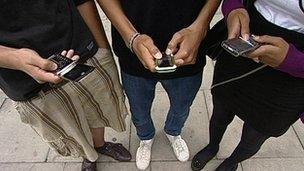Child online safety plans unveiled by Brussels
- Published

Controls on who can use apps for mobiles are almost non-existent, warns the commission
The European Commission is considering setting up an age-based authentication system that limits where children can visit online.
The system is part of <link> <caption>a series of proposals Brussels has put forward</caption> <url href="http://ec.europa.eu/information_society/activities/sip/docs/bik/en_comm.pdf" platform="highweb"/> </link> to make the net safer for children.
It says children are in danger of finding inappropriate material because ways to control where they can go are "fragmented".
More details of the authentication scheme will be published on 30 May.
In its draft proposals, the commission warns that neglecting protections for children could have a "profound impact" on European societies.
It says children's particular needs and vulnerabilities must be addressed so the net becomes a place of opportunities for them. It also notes that a uniform set of protections would help European businesses aiming services at children.
"Young people are particularly at ease with the use of the internet but they are still vulnerable to online threats," said Cecilia Malmstrom, European Commissioner for Home Affairs. "It is our duty as parents to keep our children safe - and this includes on the web."
'Dearth' of children's sites
Current child safety measures taken by member states covering parental controls, rating content and reporting illegal content are "insufficient", according to the report.
Many controls, such as filters for web pages, only work well for English, it says, and in some sectors - such as mobile apps - rating, filtering and control systems are almost non-existent.
The report also says there is a dearth of sites specifically aimed at children where they can go to learn and play, or ones which stimulate creativity and critical thinking.
It proposes a plan - via legislation, self-regulation and research grants - to create an online "ecosystem" that keeps children safe but does not make going online too dull.
The commission plans to spend more on efforts in schools that tell people how to stay safe online and educate them about ways to use the net. It will also fund research into sites designed to stimulate children.
Active protection systems have to go alongside this, it says, and Brussels expects net firms to bring in "transparent default age-appropriate privacy settings".
It also wants industry to create a system that can electronically authenticate and identify children to ensure they do not stray onto inappropriate sites or see material unsuitable for them.
To back this up, the commission will later this year unveil a framework for the electronic authentication system that is based around age. This will help with both data protection and child safety, it says.
More details of the proposals are expected to be published at the end of May. The draft proposal comes as the UK starts a consultation on how to stop children viewing pornography online.
- Published4 May 2012
- Published1 May 2012
- Published26 April 2012
- Published18 April 2012